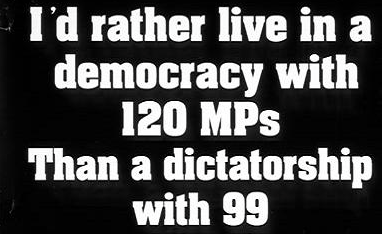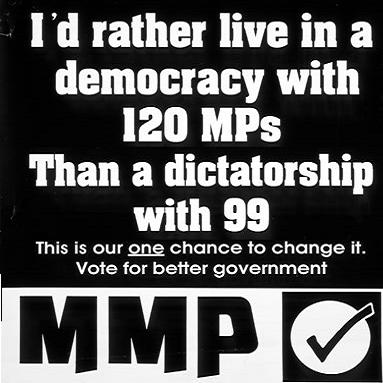Brilliant column written by Hone and Laila in the Herald today countering the claims that they are rorting MMP coat tail provision while calling for it to be changed…
At the heart of electoral democracy is the core value of ‘one person, one vote’. Let’s get a few things clear.
One: We did not design and do not support the existing thresholds for party votes to count under the current MMP rules — the 5 per cent threshold or the single electorate seat. We are advocating the removal of the single seat threshold along with the lowering of the 5 per cent.
Two: Our job is to represent our voters in Parliament, and that means making sure that their party votes are not wasted under current rules. Voters are sensible and will often vote for their second choice if their first choice could mean a wasted vote. This results in a vicious feedback cycle and is a protection racket for incumbents.
Three: Our agreement to run a joint party list under the internet-Mana name means that internet Party votes, which will be essential to a change of government in September, will be counted. Our alliance is a strategic one, and will strengthen the influence of both parties’ supporters on the election outcome and the next Parliament.
2014 will be the first real MMP election with voters using tactics and strategy and alliances to represent their views and change the Government. Damning Internet MANA for using tactics every Party has employed since MMP was established is simply the venting of bias towards Hone, Laila and Kim – it’s not considered punditry.
At the heart of electoral democracy is the core value of “one person, one vote”. That is the value that underpinned our move to MMP in 1996. Some commentators on the internet-Mana agreement, notably Brian Rudman, need to switch their mindset from a fixation with parties – instruments of democracy – to a respect for the individual voters who are democracy’s owners.
Right now, an electorate MP can be elected with fewer than 7000 local votes, while more than 100,000 voters will have their party votes disregarded if their preferred party does not win an electorate seat.
How did the 5 per cent and one-seat thresholds come to be? Because the details of MMP were designed by first past the post (FPP) incumbents, and the fine print protects them from the emergence of new parties reflecting new political constituencies. That has meant not a single new party has won political representation without the help of sitting MPs from existing parliamentary parties. Meanwhile, parties with thousands more voters than some of these, and certainly thousands more than many individual electorate MPs, have been erased by election counts.
The usual grounds given for a high threshold are unsupported claims that lower thresholds create unstable parliaments. Professor of political science Rob Salmond roundly debunked this myth in his research-based submission to the MMP review. In short, unstable parliaments result from more fundamental divisions, not from the number of parties in Parliament. Professor Salmond recommended a threshold of no more than 2 per cent.
Given a mandate from the 2011 MMP referendum to fix this unfairness, the most dominant incumbent of all, National, opted to ignore the referendum result and refused to present the public or Parliament with the opportunity to debate changes to the rules.
Naturally enough, incumbents don’t like competition, but without a competition of ideas and innovative approaches to politics our political space shrinks, and with it voter turnout. In 2011 nearly a third of those eligible didn’t vote. In various ways they have cited pointlessness as a primary reason.
Our alliance is intended as a democracy jolt.
We can assure people that their votes will count, because we have our foot in the door through the one-seat threshold. And we can and will push to make all votes count with a lower threshold and the end of the coat-tails rule.
If MMP is about representation, then why are the smaller parties locked out from that representation by such a high threshold that only benefits the larger parties?







Democracy is a Majority Dictatorship anyway …
Beats tribalism where you have you chief at the top and slaves at the bottom…..
…or communism, which is minority dictatorship…
Capitalism is the minority dictatorship as can be seen in the US. Probably the same here as well.
A Thought About Property Without The State
The end result of libertarianism is the same end result of capitalism – and that result is feudalism.
Dont forget National didnt want mmp in the first place back in 1999.
Comments are closed.